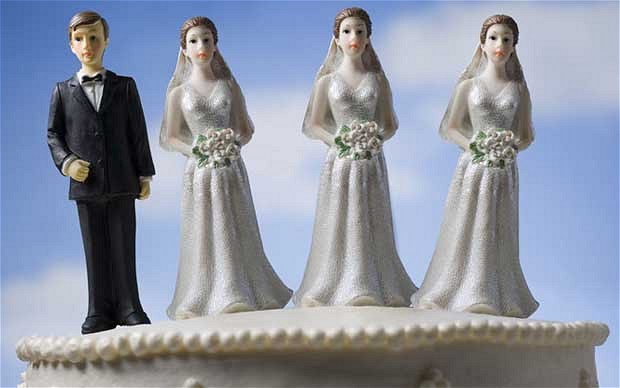Why group marriage is the next horizon of social liberalism
 Politico Magazine 26 June 2015
Politico Magazine 26 June 2015
Welcome to the exciting new world of the slippery slope. With the Supreme Court’s landmark ruling this Friday legalizing same sex marriage in all 50 states, social liberalism has achieved one of its central goals. A right seemingly unthinkable two decades ago has now been broadly applied to a whole new class of citizens. Following on the rejection of interracial marriage bans in the 20th Century, the Supreme Court decision clearly shows that marriage should be a broadly applicable right—one that forces the government to recognize, as Friday’s decision said, a private couple’s “love, fidelity, devotion, sacrifice and family.”
The question presents itself: Where does the next advance come? The answer is going to make nearly everyone uncomfortable: Now that we’ve defined that love and devotion and family isn’t driven by gender alone, why should it be limited to just two individuals? The most natural advance next for marriage lies in legalized polygamy—yet many of the same people who pressed for marriage equality for gay couples oppose it.
This is not an abstract issue. In Chief Justice John Roberts’ dissenting opinion, he remarks, “It is striking how much of the majority’s reasoning would apply with equal force to the claim of a fundamental right to plural marriage.” As is often the case with critics of polygamy, he neglects to mention why this is a fate to be feared. Polygamy today stands as a taboo just as strong as same-sex marriage was several decades ago—it’s effectively only discussed as outdated jokes about Utah and Mormons, who banned the practice over 120 years ago.
Yet the moral reasoning behind society’s rejection of polygamy remains just as uncomfortable and legally weak as same-sex marriage opposition was until recently.
That’s one reason why progressives who reject the case for legal polygamy often don’t really appear to have their hearts in it. They seem uncomfortable voicing their objections, clearly unused to being in the position of rejecting the appeals of those who would codify non-traditional relationships in law. They are, without exception, accepting of the right of consenting adults to engage in whatever sexual and romantic relationships they choose, but oppose the formal, legal recognition of those relationships. They’re trapped, I suspect, in prior opposition that they voiced from a standpoint of political pragmatism in order to advance the cause of gay marriage.
In doing so, they do real harm to real people. Marriage is not just a formal codification of informal relationships. It’s also a defensive system designed to protect the interests of people whose material, economic and emotional security depends on the marriage in question. If my liberal friends recognize the legitimacy of free people who choose to form romantic partnerships with multiple partners, how can they deny them the right to the legal protections marriage affords?
Polyamory is a fact. People are living in group relationships today. The question is not whether they will continue on in those relationships. The question is whether we will grant to them the same basic recognition we grant to other adults: that love makes marriage, and that the right to marry is exactly that, a right.
http://www.politico.com/magazine/story/2015/06/gay-marriage-decision-polygamy-119469.html#.VZCzpP4w-Um






